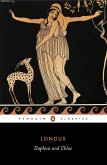One of the greatest love stories of all time. According to Wikipedia: "Daphnis and Chloe is the only known work of the 2nd century AD Greek novelist and romancer Longus. It is set on the isle of Lesbos during the 2nd century AD, which is also assumed to be the author's home... Daphnis and Chloe, two children found by shepherds, grow up together, nourishing a mutual love which neither suspects. The development of their passion forms the chief interest, and there are few incidents. Chloe is carried off by a pirate, and ultimately regains her family. Rivals trouble Daphnis' peace of mind; but the two lovers are recognized by their parents, and return to a happy married life in the country." (Cf. the movie The Blue Lagoon). Translated by George Thornley in 1657.
Dieser Download kann aus rechtlichen Gründen nur mit Rechnungsadresse in A, B, BG, CY, CZ, D, DK, EW, E, FIN, F, GR, H, IRL, I, LT, L, LR, M, NL, PL, P, R, S, SLO, SK ausgeliefert werden.









